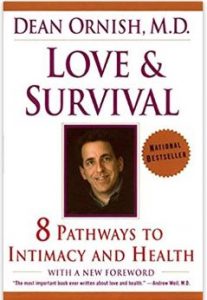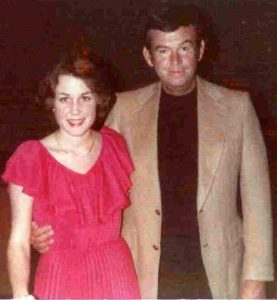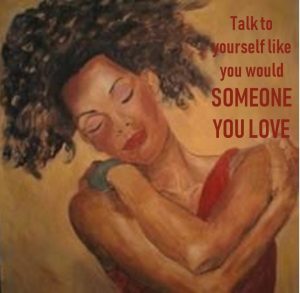As Valentine’s Day approaches, I ask you this important question: Will you be your Valentine, loving and caring for yourself as you would an irreplaceable treasured gift?
When you got your first car, you were probably aware that you could replace it later. If someone had told you that this was the only car you’d ever have, most likely you would have taken better care of it than you did. Unlike a car, we only get one body. We cannot expect to abuse a car—or our bodies—and enjoy a long and productive life.
 Dr. Dean Ornish, a Clinical Professor of Medicine at University of California San Francisco and author of the book Love and Survival: 8 Pathways to Intimacy and Health, tells us that medicine today focuses primarily on drugs, surgery, genes, and germs. We know that so much of our own health has to do with self-care, so we can mitigate preventable medical conditions.
Dr. Dean Ornish, a Clinical Professor of Medicine at University of California San Francisco and author of the book Love and Survival: 8 Pathways to Intimacy and Health, tells us that medicine today focuses primarily on drugs, surgery, genes, and germs. We know that so much of our own health has to do with self-care, so we can mitigate preventable medical conditions.
In addition to how we love and care for ourselves, Ornish reminds us that love and intimacy are at the root of what makes us sick and what makes us well. Connections with other people affect not only the quality of our lives but also our survival. Numerous studies have concluded that people who feel lonely are many times more likely to get heart disease than those who have a strong sense of connection and community. People are four times more likely to have a heart attack within six months of losing someone close to them through death or divorce.
 Valentine’s Day marks the 38th anniversary of my father’s death. When people ask how he departed this Earth at such a young age — he was only 47 years old — I tell them that he died of a broken heart. I attribute much of my father’s heart disease to the high stress he was under, as well an unwillingness to honor his own needs for a healthier diet and regular exercise. But there was one more contributing factor to his fatal heart attack: my parents had just divorced, and my father was very lonely.
Valentine’s Day marks the 38th anniversary of my father’s death. When people ask how he departed this Earth at such a young age — he was only 47 years old — I tell them that he died of a broken heart. I attribute much of my father’s heart disease to the high stress he was under, as well an unwillingness to honor his own needs for a healthier diet and regular exercise. But there was one more contributing factor to his fatal heart attack: my parents had just divorced, and my father was very lonely.
It’s ironic that my father died from a heart attack on Valentine’s Day—a day that we plaster hearts all over everything as a way to recognize those we love. The night before he died, his office assistant was visiting him in the hospital intensive care unit. He asked her to write down a message and put it in a valentine for his children. Because he was so heavily sedated, she told him that she would come back in the morning to take down his words. He begged her, “Please . . . take my message now . . . I’m going to die.” She dismissed his request—chastising him for talking such silly nonsense about dying—and said she would be back in the morning.
Even in his heavily medicated state, Dad wanted to reach out and feel connected. He wanted me and my siblings to know that he loved us. His parting gift to us was a handwritten message I will always treasure. Sometime before 2:00 a.m. on Valentine’s Day, my father scrawled a valentine message on the back of a used envelope found at his hospital bedside, expressing his final wishes that each of us experience love, joy, and peace.
Do you treat your body as if you could just swap out parts when you need them, or do you treat it with the utmost care that it deserves? In last week’s blog, Your Life Depends on It, I shared some important factors for you to pay attention to, so you can enjoy optimal health.
Self-Love
 Deborah Khoshaba wrote an article in 2012 for Psychology Today that includes a prescription for self-love, which she says is an action, not a state of feeling good. What she prescribes below echoes many of the tips I’ve shared in my last five blog articles, which you’ll find links to at the end of this article in case you want to drill down deeper.
Deborah Khoshaba wrote an article in 2012 for Psychology Today that includes a prescription for self-love, which she says is an action, not a state of feeling good. What she prescribes below echoes many of the tips I’ve shared in my last five blog articles, which you’ll find links to at the end of this article in case you want to drill down deeper.
Seven-step Prescription for Self-love:
- Become mindful. People who have more self-love tend to know what they think, feel and want. They are mindful of who they are and act on this knowledge, rather than on what others want for them.
- Act on what you need rather than what you want. You love yourself when you can turn away from something that feels good and exciting to what you need to stay strong, centered, and moving forward in your life, instead. By staying focused on what you need, you turn away from automatic behavior patterns that get you into trouble, keep you stuck in the past, and lessen self-love.
- Practice good self-care. You will love yourself more, when you take better care of your basic needs. People high in self-love nourish themselves daily through healthy activities, like sound nutrition, exercise, proper sleep, intimacy and healthy social interactions.
- Set boundaries. You’ll love yourself more when you set limits or say no to work, love, or activities that deplete or harm you physically, emotionally and spiritually, or express poorly who you are.
- Protect yourself. Bring the right people into your life. I love the term frenemiesthat I learned from my younger clients. It describes so well the type of “friends” who take pleasure in your pain and loss rather than in your happiness and success. My suggestion to you here: Get rid of them! There isn’t enough time in your life to waste on people who want to take away the shine on your face that says, “I genuinely love myself and life”. You will love and respect yourself more.
- Forgive yourself. We humans can be so hard on ourselves. The downside of taking responsibility for our actions is punishing ourselves too much for mistakes in learning and growing. You have to accept your humanness (the fact that you are not perfect), before you can truly love yourself. Practice being less hard on yourself when you make a mistake. Remember, there are no failures, if you have learned and grown from your mistakes; there are only lessons learned.
- Live intentionally. You will accept and love yourself more, whatever is happening in your life, when you live with purpose and design. Your purpose doesn’t have to be crystal clear to you. If your intention is to live a meaningful and healthy life, you will make decisions that support this intention, and feel good about yourself when you succeed in this purpose. You will love yourself more if you see yourself accomplishing what you set out to do. You need to establish your living intentions, to do this.
This Valentine’s Day, what’s one thing you will do to practice self-love? Please share in the comment section below.
If you’d like a fresh perspective– someone to help you design the balanced and healthy life you want by aligning your vision, priorities, and actions—let’s schedule a no-cost, no-pressure Discovery Call today.
Additional Resources:
- Blog: Your Life Depends on It
- Blog: Love Yourself First
- Blog: Create Space for Living Mindfully
- Blog: Balance Your Life: Environment #5 – Relationships
- Blog: Ring in the New Year with Intention
- Blog: What Are You Committed To?
- Free Webinar: Managing Priorities
- Guide: 12 Daily Habits to Improve Your Health & Well-being
- Guide: Creating New Habits










